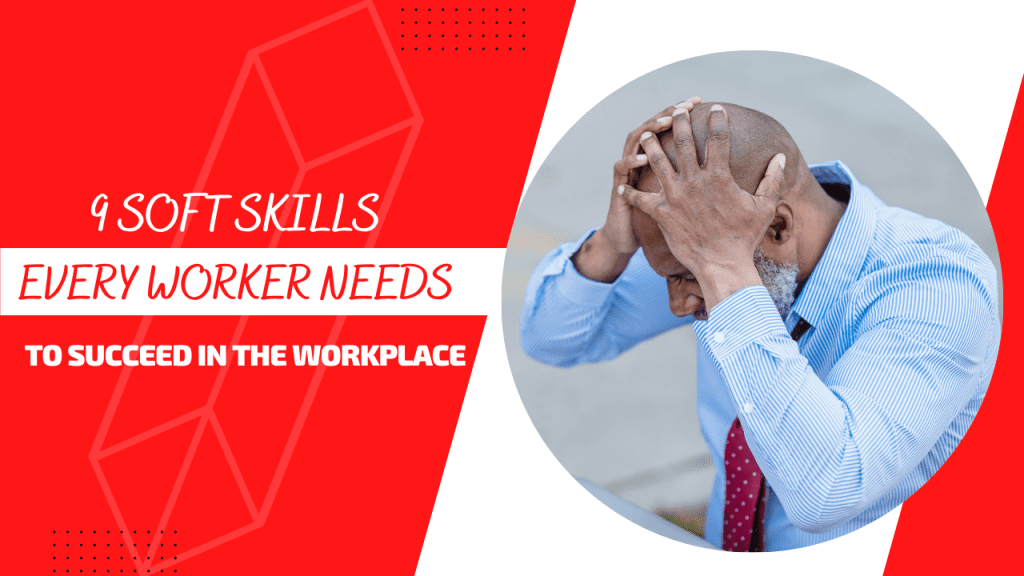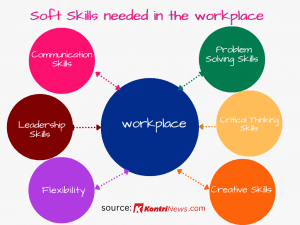9 Soft Skills Workers Need In The Workplace

Every business wants to hire employees with the skills necessary to help the company achieve its goals. However, what many businesses don’t realize is that there are other skills that are just as important – soft skills. Soft skills are personal qualities that make someone successful in the workplace. They include things like communication, problem-solving, and teamwork. In this blog post, we will discuss nine of the most important soft skills that every employee needs!
Why workers need soft skills in the workplace
The reason why soft skills are so important is that they can be the difference between success and failure in the workplace. Hard skills might get you in the door, but it is soft skills that will help you to progress and succeed in your career.
Soft skills workers need in the workplace
- Communication Skills
- Collaboration Skills
- Flexibility
- Problem Solving Skills
- Critical Thinking Skills
- Creative Skills
- Organizational Skills
- Interpersonal Skills
- Leadership Skills
There are a variety of soft skills that can be beneficial in the workplace. Some of the most important soft skills include:
1) Communication Skills
In work settings, communication is key to maintaining positive relationships with colleagues, supervisors, and clients. Good communication can lead to increased productivity, improved working relationships, and a better overall work environment.
There are a few key things to keep in mind when communicating in a work setting:
- Be clear and Concise
- Listen
- Be respectful
- Be professional
- a) Be clear and concise: When communicating at work, it is important to be clear and concise in your communication. This means being able to deliver your message in a way that is easy for others to understand. Use simple language and avoid jargon.
- b) Listen: In order to effectively communicate, you need to be a good listener. This means taking the time to listen to what others are saying and trying to understand their perspective.
- c) Be respectful: When communicating in a work setting, it is important to be respectful of others. This means using polite language and avoiding offensive or inflammatory language.
- d) Be professional: Always remember to be professional when communicating in a work setting. This means maintaining a positive attitude, being honest, and keeping your emotions in check.
2) Collaboration Skills
Working well with others is an important soft skill, as it can help to increase productivity and creativity in the workplace.
Collaboration skills are important in the workplace because they allow employees to work together effectively to achieve common goals. Good collaboration skills can help employees communicate better, solve problems more effectively, and make better decisions.
3) Flexibility
Being able to adapt to change is an important soft skill, as it can help employees to be successful in an ever-changing business environment.
Flexibility is the ability to adapt to changing circumstances. It’s an important quality in the workplace because, as the world around us continues to change, our jobs often require us to change with it.
Being flexible at work can mean different things depending on the situation. For example, it could involve being able to work different hours when needed, being open to change in the workplace, or being able to handle unexpected tasks or assignments.
Being flexible is often seen as a positive quality by employers, as it shows that you’re adaptable and able to deal with change. It can also make you more productive and efficient in your work.
4) Problem-Solving Skills
Problem-solving skills are essential in any workplace. Whether you’re dealing with customers, clients, colleagues, or superiors, the ability to solve problems quickly and effectively is an important part of your job.
There are a few key things to keep in mind when solving problems at work:
- a) Be calm and collected. It’s important to stay calm when dealing with a problem, especially if it’s a difficult or sensitive issue. Losing your cool will only make the situation worse.
- b) Be patient. Don’t rush into a solution without taking the time to fully understand the problem. Otherwise, you may end up making things worse.
- c) Be creative. Don’t be afraid to think outside the box when it comes to solving problems. Sometimes the best solutions are the ones that are the most unexpected.
- d) Be proactive. Don’t wait for problems to come to you, go out and find them. Proactive problem-solving can help you avoid potential issues before they become actual problems.
5) Critical Thinking Skills
Critical thinking skills are important in the workplace because they allow employers to make sound decisions. When faced with a problem, critical thinkers are able to analyze the situation and come up with a solution. This type of thinking is essential for businesses to run smoothly and efficiently.
Critical thinkers are able to see both sides of an issue and make a decision based on logic, not emotion. They are able to look at a problem from all angles and come up with the best possible solution. This type of thinking is essential in the workplace because it allows employees to make sound decisions without being swayed by personal feelings or opinions.
6) Creative Skills
Most people believe that creativity is something that only artists and other “creative types” possess. However, creativity is actually a skill that anyone can learn and use in their daily lives, both at work and at home.
There are many benefits to being creative in the workplace. For one, it can help you come up with new and innovative ideas that can help your company succeed. It can also help you solve problems more effectively and come up with more efficient solutions.
In addition, creativity can also make you more productive. Studies have shown that people who are more creative tend to be more productive than those who are less creative. This is because they are able to generate new ideas and find new ways of doing things.
7) Organizational Skills
Organizational skills are important in the workplace because they help employees to be productive and efficient. These skills allow workers to complete tasks quickly and effectively, without wasting time or resources. Good organizational skills can also help workers to stay organized and focused on their work, which can lead to better job performance and satisfaction. Additionally, strong organizational skills can help employees to avoid stress and burnout, as they are better able to manage their time and workload.
8) Interpersonal Skills
Being able to effectively interact with others is an important soft skill, as it can help employees to build better relationships in the workplace.
Interpersonal skills are the set of skills that enable people to interact effectively with others. They involve communication, problem-solving, and relationship management.
Interpersonal skills are important in all aspects of work, from managing a team to dealing with customers. Good interpersonal skills can help you progress in your career and build strong working relationships.
There are a number of ways to develop your interpersonal skills. Training courses, books, and online resources can all be helpful. You can also practice these skills in your everyday interactions with others.
9) Leadership Skills
In the workplace, leadership skills are vital for promoting productivity, efficiency, and overall morale. Good leaders possess a number of qualities that enable them to successfully motivate and manage employees. Some of the most important leadership skills include communication, delegation, conflict resolution, and problem-solving.


Summary
The workplace is constantly changing and evolving. In order to keep up, workers need to be adaptable and have a variety of soft skills. These skills will help them communicate better, work with others, think critically, and solve problems. If you want to succeed in the workplace, it’s important to develop these essential skills.








